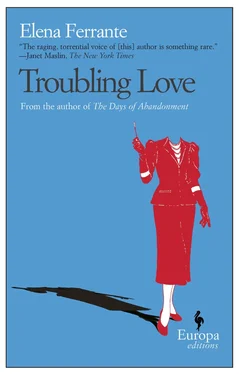When the telephone rang, she pulled her head up suddenly, so that the wet hair flew from the floor through the air, grazing the ceiling and falling on her back with a slap that woke me completely. I turned on the light. I couldn’t remember where the telephone was, and meanwhile it kept ringing. I found it in the hall, an old telephone of the sixties that I knew well, attached to the wall. When I answered a male voice called me Amalia.
“I’m not Amalia,” I said. “Who is it?”
I had the impression that the man on the telephone struggled to repress a laugh. He repeated, “I’m not Amalia,” in falsetto, and then resumed, in the purest dialect: “Leave the bag with the dirty clothes on the top floor. You promised it to me. And look carefully: you’ll find the suitcase with your things. I put it there for you.”
“Amalia is dead,” I said in a calm voice. “Who are you?”
“Caserta,” said the man.
The name sounded like the name of the bogeyman in a fable.
“I’m Delia,” I answered. “What is on the top floor? What do you have of hers?”
“I, nothing. It’s you who have something of mine,” the man said, again in falsetto, distorting my Italian in an affected manner.
“You come here,” I said to him in a persuasive tone. “We can talk about it and you can take what you need.”
There was a long silence. I waited for an answer but there was none. The man had not hung up: he had simply let go of the receiver and walked away.
I went to the kitchen and drank a glass of water; the water was dense and had a terrible smell. Then I returned to the telephone and dialed Uncle Filippo’s number. He answered after five rings and before I could even say hello, began shouting into the telephone insults of every sort.
“It’s Delia,” I said harshly. I felt that he was having trouble identifying me. When he remembered me, he began to mutter excuses, calling me “my child,” and asking again and again if I was all right, where I was, what had happened.
“Caserta called me,” I said. Then, before he could start again on the rosary of curses, I ordered him, “Calm down.”
Afterward I went back to the bathroom. With one foot I kicked my dirty underpants behind the bidet, and then picked up Amalia’s lingerie, which I had scattered over the floor, and put it back in the garbage bag. Then I went out to the landing. I was no longer either depressed or uneasy. I carefully closed the door, using both locks, and pushed the button for the elevator.
Once inside, I pressed the button for the sixth floor. At the top, I left the doors of the elevator open so that the dark space was at least partly illuminated. I discovered that the man had lied: my mother’s suitcase wasn’t there. I thought of going back down but changed my mind. I placed the garbage bag in the rectangle of light left by the elevator and then closed the doors. In the dark I settled myself in a corner of the landing from which I could see clearly anyone who came out of the elevator or arrived by the stairs. I sat on the floor.
For decades, Caserta had been for me a city of haste, a restless place where everything went faster than in other places. Not the royal city to whose eighteenth-century park with its cascading waterfalls I had gone as a child the Monday after Easter, and where, amid hordes of day-trippers, lost in a vast clan of relatives, I ate salami from Secondigliano and hardboiled eggs inside an oily, peppery dough. Of the city and the park memory could put into words only the rapid streams of water and the terrifying pleasure of getting lost as the shouts calling me back grew more and more distant. But what my less easily verbalized emotions recorded under the word Caserta was a spinning nausea, vertigo, and a lack of air. Sometimes that place, which belonged to a less reliable memory, consisted of a dimly lighted staircase and a wrought-iron banister. At other times it was a patch of light striped by bars and covered by a fine screen, which I observed crouching underground, in the company of a child named Antonio, who held me tightly by the hand. The sounds that accompanied it, like the soundtrack of a film, were pure commotion, sudden banging, as of things formerly in order that abruptly collapse. The odor was of lunchtime or dinnertime, when, coming from every doorway, the smells of the various dishes mingle in the stairwell but are ruined by a stink of mold and cobwebs. Caserta was a place where I wasn’t supposed to go, a bar with a sign: a dark woman, palm trees, lions, camels. It had the taste of sugared almonds in an exquisite candy box, but you were forbidden to enter. If little girls went in they never came out again. Not even my mother was supposed to go there, or my father would kill her. Caserta was a man, a silhouette of dark fabric. The silhouette, hanging on a thread, rotated, turning first one way, then the other. We were not allowed to mention him. Amalia was often chased through the house, caught, struck in the face first with the back of the hand, then the palm, only because she had said: “Caserta.”
This in my less datable memories. In the clearer ones there was Amalia herself who spoke of him secretly, of that man-city of waterfalls and hedges and stone statues and pictures of palm trees and camels. She didn’t speak of him to me, who perhaps was playing under the table with my sisters. She spoke of him to others, to the women who were making gloves with her at home. Somewhere in my brain I preserved echoes of phrases. One remained very clear in my mind. It was not even words, or no longer was, but sounds compacted and made concrete in an image. That Caserta, my mother said in a whisper, had pushed her into a corner and tried to kiss her. I, hearing her, saw the man’s open mouth, with bright white teeth and a long red tongue. The tongue shot out from the lips and retracted at a velocity that hypnotized me. As an adolescent I would close my eyes on purpose to reproduce that scene, and would contemplate it with a mixture of attraction and repulsion. But I felt guilty, as if I were doing something forbidden. By then I knew that in that image of fantasy there was a secret that could not be revealed, not because one part of me didn’t know how to get to it but because, if I did, the other part would have refused to name it and would have driven me out.
On the telephone, just before, Uncle Filippo had said to me some things that I already knew in a confused way: he spoke of them and I knew. They could be summed up thus: Caserta was a contemptible man. As a boy he had been a friend of his and of my father. After the war, they had had some profitable business dealings: he had seemed a clear-headed, sincere young man. But he had eyed my mother. And not only her: he was already married, he had a son, but he bothered all the women in the neighborhood. When he went too far, my uncle and my father had taught him a lesson. And Caserta with his wife and child had gone to live in another place. My uncle had concluded in a threatening dialect: “He wouldn’t get her out of his head. So we made the desire get out forever.”
Silence. I had seen blood between cries and insults. Ghosts upon ghosts. Antonio, the child who held my hand, had gone down into the darkest part of the basement. For an instant I felt the domestic violence of my childhood and adolescence return to my eyes and ears as if it were oozing along a thread that joined us. But I realized for the first time that now, after so many years, it was what I wanted.
“I’m coming over,” Uncle Filippo had suggested.
“What do you think a man of seventy can do to me?”
He was confused. Before hanging up I had promised that I would call him back if I heard from Caserta again.
Now I was waiting on the landing. At least an hour passed. The glow of lights in the stairwell from the other floors allowed me to check, once I got used to the dark, the whole area. Nothing happened. Finally around four in the morning the elevator jerked abruptly and the light went from green to red. The car slid down.
Читать дальше












